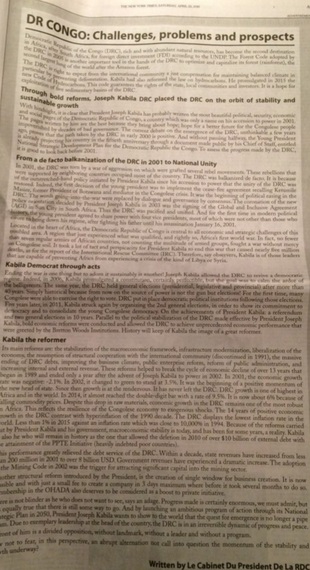It's not often that a dictator takes out an advertisement in The New York Times. But there it was on Sunday, full-page spread touting President Joseph Kabila's supposed record of championing democracy and reform in the Democratic Republic of Congo.
"With hindsight, it is clear that President Joseph Kabila has probably written the most beautiful political, security, economic and social pages of the Democratic Republic of Congo," the ad reads. Maybe the fact-checkers at The Times were on vacation when this ad came in.
Here's why I say this. A few months ago, amid growing concern in Washington that Kabila had no intention of stepping down when his country's constitution requires him to, I wrote that the time had come to "stare down a tyrant." Nothing has changed. In fact, democracy and freedom of expression are under greater assault than ever in the DRC -- and the situation looks to be getting worse, with Kabila still refusing to hold national elections later this year to elect his successor.
The advertisement in The Times ran less than 24 hours before security forces used tear gas, blockades and possibly rubber bullets to break up a rally celebrating democracy in the city of Lubumbashi. The city is the base of Moise Katumbi, the popular former governor of Kantanga province, who has been nominated to be a presidential candidate by the coalition of former Kabila loyalists called the G-7. Media reports indicated Katumbi and others were encircled by their supporters and whisked away from scene.
This was just a few days after reports that security forces removed posters with the images of Katumbi and Gabriel Kyungu wa Kumwanza, another former ally of Kabila, and then used tear gas to repel the crowd of several hundred people who protested the blatant attempt to suppress political expression.
Kabila's public relations was clearly designed to coincide with his visit to the United Nations last week. For its part, the UN sees the pages written during the Kabila years as a little less than "beautiful." The day the New York Times "advertisement" ran, Maman Sidikou, the head of the United Nations Organization Stabilization Mission in the DRC (MONUSCO) reiterated "serious concern" about rising political tensions in some parts of the country. He urged authorities in the DRC to do all they could to "uphold the rule of law and desist from any actions that could impede political actors from exercising their constitutional rights and freedoms, including the freedom of expression, association and assembly." Earlier this month, the UN Security Council voted to extend MONUSCO's mission in the DRC out of concern about an imminent human rights crisis.
While in New York, Kabila met with Secretary of State John Kerry. If Kabila was looking for support for the course he is on, it looks like he came up short. Not long after the meeting, Kerry's spokesman John Kirby tweeted that the secretary had "reinforced the importance of Constitutional elections, safe space for Congo civil society."
The State Department is clearly concerned about the turn of events in the DRC. Earlier this year, Thomas Perriello, the special envoy to the region, warned a congressional committee of Kabila efforts "to close citizen space and postpone the start of election preparations raise concerns that Kabila intends to try to hold onto power beyond his Constitutional term that concludes in December." At that time, he said Kabila had "not yet crossed any 'points of no return.'"
The ad is little more than Kabila's desperate attempt to convince the world that he has not, in fact, crossed that point. But the United States cannot allow him to get away with this. As I said two months ago, it is time for a muscular, action-oriented strategy to match the diplomatic words from the State Department. Kabila has closed the "political space" and chances for opening back seem to be shrinking with the passage of time.

